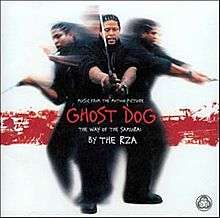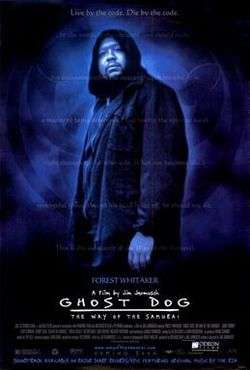Ghost Dog: The Way of the Samurai
| Ghost Dog: The Way of the Samurai | |
|---|---|
|
Theatrical release poster | |
| Directed by | Jim Jarmusch |
| Produced by |
Richard Guay Jim Jarmusch |
| Written by | Jim Jarmusch |
| Starring |
Forest Whitaker John Tormey Henry Silva Cliff Gorman Isaach De Bankolé |
| Music by | RZA |
| Cinematography | Robby Müller |
| Edited by | Jay Rabinowitz |
Production company |
Pandora Filmproduktion Arbeitsgemeinschaft der öffentlich-rechtlichen Rundfunkanstalten der Bundesrepublik Deutschland (ARD) Degeto Film Plywood Productions Bac Films Canal+ JVC Entertainment Networks |
| Distributed by | Artisan Entertainment |
Release dates |
|
Running time | 116 minutes |
| Country |
United States France Germany Japan |
| Language | English |
| Budget | $2 million |
| Box office | $9.4 million |
Ghost Dog: The Way of the Samurai is a 1999 American crime action film written and directed by Jim Jarmusch. Forest Whitaker stars as the title character, the mysterious "Ghost Dog", a hitman in the employ of the Mafia, who follows the ancient code of the samurai as outlined in the book of Yamamoto Tsunetomo's recorded sayings, Hagakure. Critics have noted similarities between the movie and Jean-Pierre Melville's 1967 film Le Samouraï.
Plot
Ghost Dog (Forest Whitaker) sees himself as a retainer of Louie (John Tormey), a local mobster, who saved Ghost Dog's life years ago. While living as a hired hitman for the Italian Mafia, he adheres to the code of the samurai, and interprets and applies the wisdom of the Hagakure in his contracts for the mob.
Louie tells Ghost Dog to kill a gangster, Handsome Frank, who is sleeping with the daughter (Tricia Vessey) of local mafia don Vargo (Henry Silva). Ghost Dog arrives and kills the gangster, before seeing that the girl is also in the room at the time; she lends him a book; he leaves her alive, and exits. In order to avoid being implicated in the murder of a made man, Vargo and his associate Sonny Valerio decide to get rid of Ghost Dog. Louie knows practically nothing about Ghost Dog, and the hitman communicates only by homing pigeon. The mobsters start by tracing all the pigeon coops in town. They find Ghost Dog's cabin atop a building and kill his pigeons. Ghost Dog realizes he must kill the entire mafia or otherwise they will kill him and his master.
During the day, Ghost Dog frequently visits the park to see his best friend, a Haitian ice cream salesman named Raymond (Isaach De Bankolé) who speaks only French. Ghost Dog does not understand French and Raymond does not understand English, but the two seem to understand each other. Ghost Dog also makes friends with a little girl named Pearline (Camille Winbush), to whom he lends the book —Rashōmon and Other Stories— he received from Vargo's daughter. Paralleling a major theme of Rashōmon, Louie and Ghost Dog have different accounts of the circumstances of their meeting: in Louie's flashback he shoots Ghost Dog's attacker in self-defense, while in Ghost Dog's flashback, Louie shoots the attacker just as the attacker is about to kill Ghost Dog.
Eventually, Ghost Dog attacks Vargo's mansion single-handedly and kills almost everyone he encounters, sparing only Louie and Vargo's daughter. At night, Ghost Dog kills Sonny Valerio in his house, shooting a bullet through Valerio´s bathroom pipe. Ghost Dog is later expecting that Louie attacks him (as he feels that, according to the mob code, Louie must avenge the murder of his boss Vargo). He goes to the park and gives Raymond all his money, helping him to stay in the country and build a boat. Pearline appears and gives back Rashōmon to Ghost Dog, expressing that she liked it. Ghost Dog then gives Pearline his copy of Hagakure and encourages her to read it.
Though Louie feels some loyalty to Ghost Dog, he finally confronts Ghost Dog at Raymond's ice cream stand with Raymond and Pearline watching. Ghost Dog is unwilling to attack his master and allows Louie to kill him. His last act is to give Louie the copy of Rashōmon and encourage him to read it. It is then revealed that Vargo's daughter ordered Louie to murder Ghost Dog. Pearline takes Ghost Dog's gun and shoots at Louie, but the gun is empty. Ghost Dog dies peacefully with Raymond and Pearline at his side. Later, Pearline reads passionately the Hagakure, indicating that she may follow Ghost Dog's way in the future.
Cast
- Forest Whitaker as Ghost Dog
- John Tormey as Louie
- Henry Silva as Ray Vargo
- Cliff Gorman as Sonny Valerio
- Isaach De Bankolé as Raymond
- Camille Winbush as Pearline
- Tricia Vessey as Louise Vargo
- Gene Ruffini as Old Consigliere
- Frank Minucci as Big Angie
- Richard Portnow as Handsome Frank
- Frank Adonis as Valerio's Bodyguard
- Victor Argo as Vinny
- Kenny Guay as Boy in Window
- Vince Viverito as Johnny Morini
- Dennis Liu as Chinese Restaurant Owner
- RZA as Samurai in Camouflage
- Gary Farmer as Nobody (Cayuga Native American)
- Shi Yan Ming as Kung-Fu Master
Production
The film was shot mostly in Jersey City, New Jersey, but the movie never mentions where the story is set. License plates reveal it is in "The Industrial State"[1] and a vehicle from another state has on its license plate "The Highway State", both of which are fictional state nicknames.
Reception
Critical response to the film was largely positive. On the Rotten Tomatoes review site, the film received an 82% "Certified Fresh" rating. The critical consensus was that the movie is "An innovative blend of samurai and gangster lifestyles."[2] The film was nominated for a few awards but did not win any of them. Among the nominations were the Grand Prix of the Belgian Syndicate of Cinema Critics, the César Award for Best Foreign Film of 2000[3] and the Palme d'Or award at the 1999 Cannes Film Festival.[4] The film grossed a worldwide total of $9,380,473, of which $3,308,029 was in the United States.[5]
Casting notes
Gary Farmer is credited as playing a character named "Nobody", the same name as his character in Jarmusch's 1995 western Dead Man. After he is confronted by some mob hitmen on his roof, Nobody repeats one of his lines from Dead Man: "stupid fucking white man!" Forest Whitaker's younger brother Damon Whitaker plays the role of the young Ghost Dog in the flashback sequences.
Soundtrack

The film's score and soundtrack is the first produced by the Wu-Tang Clan's RZA.
US and Japanese versions of the soundtrack album have been released, each with a different set of tracks. The Japanese release also has some songs not in the film.[6] Songs in the film that don't appear on either soundtrack album include From Then Till Now performed by Killah Priest, Armagideon Time performed by Willi Williams, Nuba One performed by Andrew Cyrille and Jimmy Lyons and Cold Lampin With Flavor performed by Public Enemy.[7]
Cultural references
The film has been interpreted by critics as an homage to Le Samouraï, a 1967 crime-drama by Jean-Pierre Melville starring Alain Delon. That movie opens with a quote from an invented Book of Bushido and features a meditative, loner hero, Jef Costello. In the same manner that Ghost Dog has an electronic "key" to break into luxury cars, Costello has a huge ring of keys that enable him to steal any Citroën DS.[8][9] The endings share a key similarity. Moreover, the peculiar relationship between the heroes of both movies and birds, as companions and danger advisers, is another common theme.
The film contains a number of references to Seijun Suzuki's Branded to Kill, such as when a bird lands in front of Ghost Dog's rifle scope, referencing the incident with a butterfly in Suzuki's film.[10] Ghost Dog shooting Sonny Valerio up the drain pipe is taken directly from Branded to Kill.
Cartoons are used as a motif that parallels plot developments. Handsome Frank watches a cartoon featuring Betty Boop corralling her pigeons moments before Ghost Dog, a fellow pigeon raiser, arrives to assassinate him. Ghost Dog is later seen handling his pigeons in the same manner as Betty. Boss Vargo watches a Felix the Cat cartoon wherein the Professor voices his frustration at capturing the elusive Felix and his magic bag, mirroring the mafia's inability to find and eliminate Ghost Dog, who carries his weapons and equipment in a black briefcase. Vargo and his daughter, Louise, watch a Woody Woodpecker cartoon in the car, immediately after Ghost Dog has been distracted by a woodpecker while sniping in the woods. The cartoon features a staring contest between Woody and the Grim Reaper. Vargo's daughter watches an episode of The Itchy & Scratchy Show (in which Itchy and Scratchy threaten each other with increasingly bigger guns, before blowing up the earth) before the equally violent battle which concludes the film.
Guardians of Order published the Ghost Dog: The Way of the Samurai role-playing game in 2000.
References
- ↑ "Cold Warrior Jeannette Catsoulis on Ghost Dog: The Way of the Samurai". reverse shot. 2005. Retrieved 2006-10-13.
- ↑ "Ghost Dog: The Way of the Samurai". Rotten Tomatoes. 1999. Retrieved 2006-08-30.
- ↑ "Awards for Ghost Dog: The Way of the Samurai". Internet Movie Database. 2001. Retrieved 2006-08-30.
- ↑ "Festival de Cannes: Ghost Dog: The Way of the Samurai". festival-cannes.com. Retrieved 2009-10-06.
- ↑ "Ghost Dog: The Way of the Samurai". Box Office Mojo. 2006. Retrieved 2006-08-30.
- ↑ "Ghost Dog: The Way of the Samurai". Soundtrack Collector. 1999. Retrieved 2006-10-12.
- ↑ "Soundtracks for Ghost Dog: The Way of the Samurai". Internet Movie Database. 1999. Retrieved 2006-09-06.
- ↑ "Into the Void". Village Voice. March 2000. Retrieved 2007-12-06.
- ↑ "Ghost Dog: The Way of the Samurai (2000) Reel Review". Reel.com. Archived from the original on 2007-10-17. Retrieved 2007-12-06.
- ↑ Wilonsky, Robert (March 23, 2000). "The Way of Jim Jarmusch". Miami New Times. Retrieved May 7, 2009.
External links
| Wikiquote has quotations related to: Ghost Dog: The Way of the Samurai |
- Ghost Dog: The Way of the Samurai at the Internet Movie Database
- Ghost Dog: The Way of the Samurai at AllMovie
- Ghost Dog: The Way of the Samurai at Rotten Tomatoes
- Interview with Ian Johnston at louderthanwar.com
